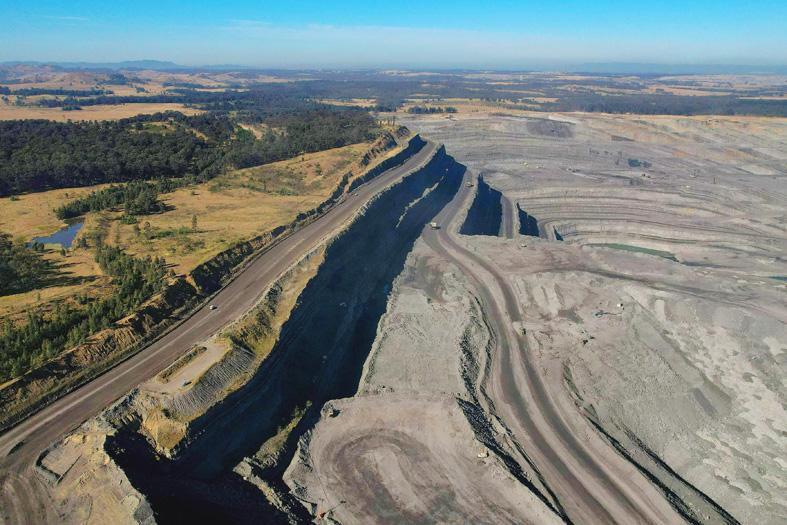Switzerland-based mining and commodity trading giant Glencore PLC has agreed to supply coal to a Japanese customer at one of the highest prices ever paid by the nation, threatening to further accelerate inflation.
Nippon Steel Corp agreed on a supply deal through March next year with Glencore for power plant coal at US$375 per tonne, said people with knowledge of the deal who asked not to be identified because the information is private.
The agreement is three times more expensive than similar deals struck last year and is likely one of the costliest coal contracts ever signed by a Japanese company, one of the people said.

Photo: Reuters
Spokespeople for Glencore and Nippon Steel declined to comment.
Global competition for coal and natural gas is escalating as power generators move to secure additional fuel shipments amid an energy crunch.
Utilities are curbing imports from Russia due to Moscow’s war in Ukraine, tightening the amount of available supply and sending prices surging.
Japan has been struggling with strained electricity supplies and high demand during a heat wave over the past few weeks.
Nippon Steel, which uses fuel to power its industrial sites and supplies electricity to Japan’s grid, earlier this month purchased the country’s most expensive ever natural gas shipment.
Glencore is the world’s top coal shipper, and profits from the power plant fuel are at an all-time high.
The resource giant is on course for a record year as it cashes in on soaring prices and volatility.
The Glencore deal might be used as the benchmark price for other annual supplies by thermal coal users in Asia, the people said.
That would boost the cost to generate electricity, and threaten to increase power bills for businesses and households.
Australian Newcastle coal futures closed at US$410.45 per tonne on Tuesday on ICE Futures Europe, after setting a record earlier this year.
European coal futures for next year rallied to an all-time high on Tuesday as Russia threatens to curb gas supplies to the continent.
Separately, Rio Tinto Group reported a sharp decline in profits in the first half of the year and cut its dividend in half, in the latest sign that a bonanza era of record returns across the mining industry is nearing an end.
A year earlier, the world’s biggest producers were enjoying supersized returns, after key commodities such as iron ore and copper surged.
Now, profit margins are being squeezed as recessionary worries drive prices lower while costs across the sector are ballooning.
Rio reported underlying earnings of US$8.6 billion in the first half, missing the average analyst estimate and down from a record US$12.2 billion last year.
The company is planning to pay a US$4.3 billion dividend compared with US$9.1 billion it returned a year earlier.

SEEKING CLARITY: Washington should not adopt measures that create uncertainties for ‘existing semiconductor investments,’ TSMC said referring to its US$165 billion in the US Taiwan Semiconductor Manufacturing Co (TSMC, 台積電) told the US that any future tariffs on Taiwanese semiconductors could reduce demand for chips and derail its pledge to increase its investment in Arizona. “New import restrictions could jeopardize current US leadership in the competitive technology industry and create uncertainties for many committed semiconductor capital projects in the US, including TSMC Arizona’s significant investment plan in Phoenix,” the chipmaker wrote in a letter to the US Department of Commerce. TSMC issued the warning in response to a solicitation for comments by the department on a possible tariff on semiconductor imports by US President Donald Trump’s

‘FAILED EXPORT CONTROLS’: Jensen Huang said that Washington should maximize the speed of AI diffusion, because not doing so would give competitors an advantage Nvidia Corp cofounder and chief executive officer Jensen Huang (黃仁勳) yesterday criticized the US government’s restrictions on exports of artificial intelligence (AI) chips to China, saying that the policy was a failure and would only spur China to accelerate AI development. The export controls gave China the spirit, motivation and government support to accelerate AI development, Huang told reporters at the Computex trade show in Taipei. The competition in China is already intense, given its strong software capabilities, extensive technology ecosystems and work efficiency, he said. “All in all, the export controls were a failure. The facts would suggest it,” he said. “The US

The government has launched a three-pronged strategy to attract local and international talent, aiming to position Taiwan as a new global hub following Nvidia Corp’s announcement that it has chosen Taipei as the site of its Taiwan headquarters. Nvidia cofounder and CEO Jensen Huang (黃仁勳) on Monday last week announced during his keynote speech at the Computex trade show in Taipei that the Nvidia Constellation, the company’s planned Taiwan headquarters, would be located in the Beitou-Shilin Technology Park (北投士林科技園區) in Taipei. Huang’s decision to establish a base in Taiwan is “primarily due to Taiwan’s talent pool and its strength in the semiconductor

French President Emmanuel Macron has expressed gratitude to Hon Hai Precision Industry Co (鴻海精密) for its plan to invest approximately 250 million euros (US$278 million) in a joint venture in France focused on the semiconductor and space industries. On his official X account on Tuesday, Macron thanked Hon Hai, also known globally as Foxconn Technology Group (富士康科技集團), for its investment projects announced at Choose France, a flagship economic summit held on Monday to attract foreign investment. In the post, Macron included a GIF displaying the national flag of the Republic of China (Taiwan), as he did for other foreign investors, including China-based